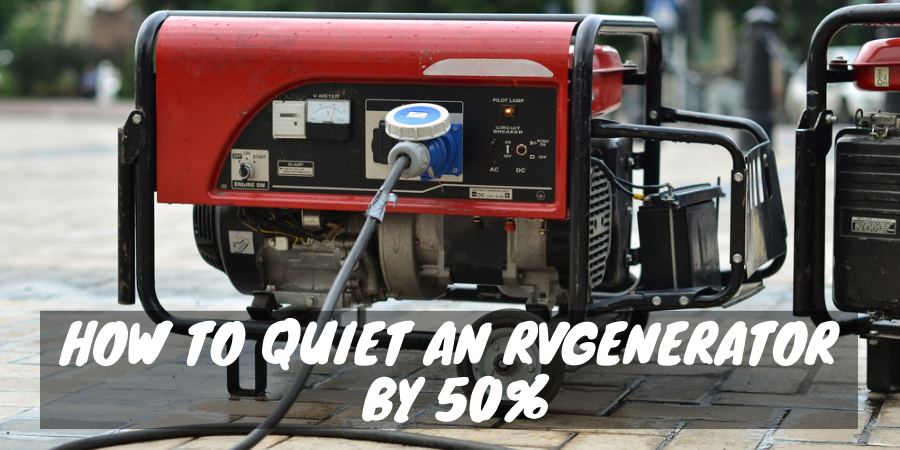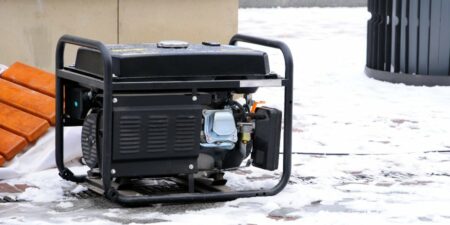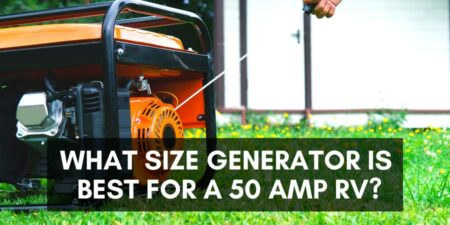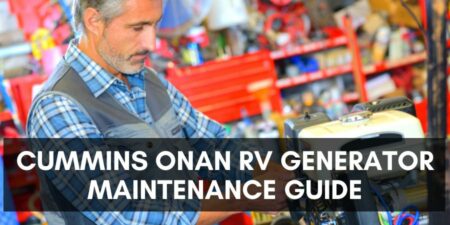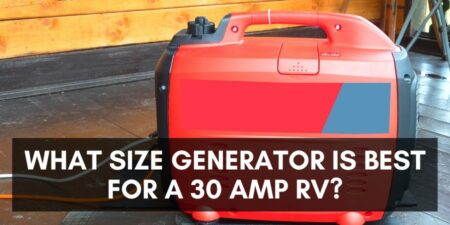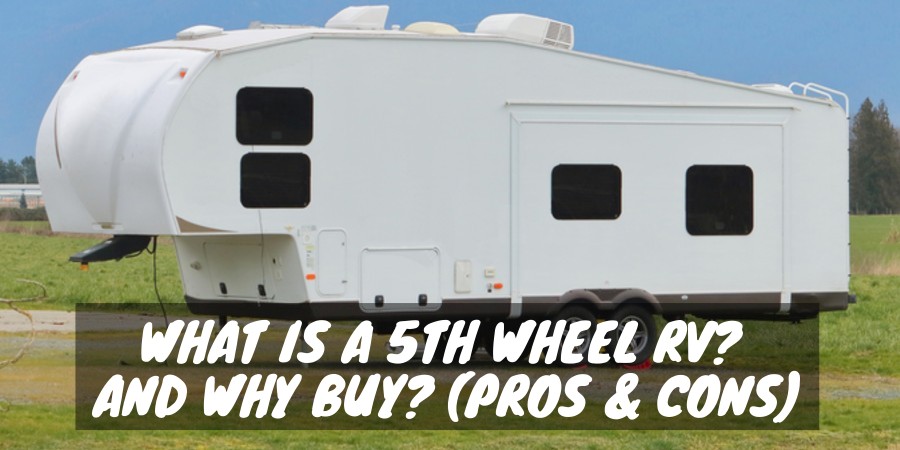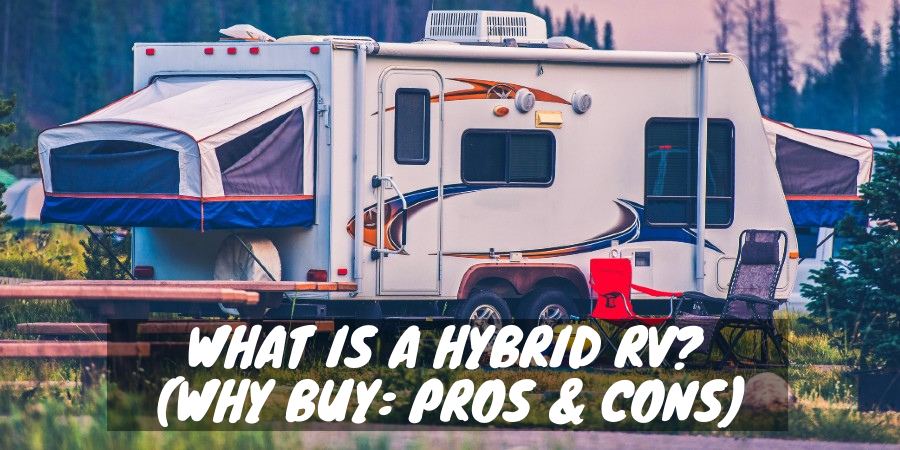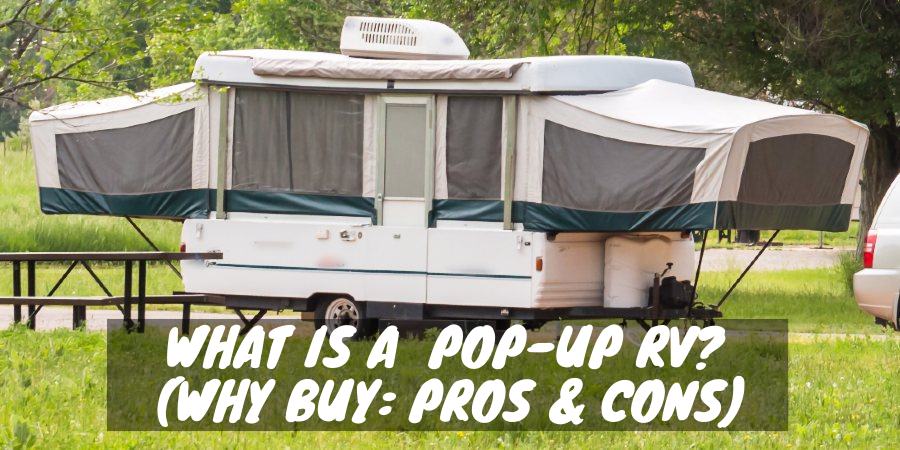Generators are an RVing necessity, but they sure are noisy!
While generator manufacturers try to create models that are easier on the ears, running most units will quickly ruin the peace people expect while camping.
Thankfully, there are tricks to reduce generator noise, and I put the most effective in this guide.
When you follow the methods I list below, you’ll learn how to quiet your RV generator by 50% and dramatically increase both on and off-grid camping enjoyment, so let’s check them out!
Reasons You Need to Reduce Generator Noise
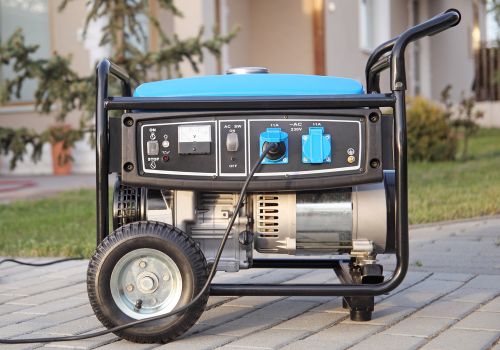
Most standard generators are noisy, especially when under a full load. Decibel levels average anywhere from 60 dB to 100 dB, with any number over 70 dB considered a nuisance.
The U.S. standard for calculating generator decibel level is by testing the sound using a microphone that is 21 feet away from the unit.
Most RVers aren’t able to locate their generator that far from their camper, which means the decibel level will be even louder in real-time use. Using an affordable decibel meter can help you regulate bringing generator noise down to an appropriate level.
We all know that generators are not cheap. Once you invest in this portable power source, most of us can’t afford to replace a perfectly good operating unit with a newer, less noisy model.
Many campgrounds forbid generator usage, while others only allow them to run during specific hours. When you can muffle the sound during use, often you can “get away” with running your generator without campground staff knowing or having other guests complain.
For RVers who rely on their generator for off-grid camping comfort, a quiet generator allows you to enjoy your trip without having to shout during conversations or drown out the sounds of nature.
Hearing damage from exposure to high decibels is real, so it’s smart always to try to reduce noise levels whenever possible, even if you have a “whisper quiet” new generator unit.
How to Quiet Your RV Generator
There are several ways you can quiet your RV generator, aside from moving the unit as far away from your camper as possible during use.
Since most campgrounds have other RVs in close proximity, moving your generator farther away isn’t an option in most instances since you’ll only be moving the noise closer to other guests.
The trick to running your generator quietly is to use the following methods in combination to considerably lower decibel levels by 50%.
#1 Buffer Generator Sound and Vibration
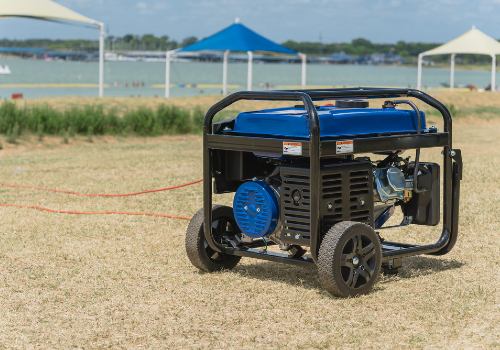
The first trick to instantly lower generator noise is to place the unit on the grass or ground and not on a cement or asphalt surface.
The ground will absorb the sound waves and not amplify them as happens on a solid surface.
Another way to add to the sound buffering is to place a thick rubber pad under the generator to dissipate more sound waves and help reduce any noise associated with the unit vibrating.
Another simple tip I learned from a fellow RVer is to place the generator behind a wide tree (if available) and let the trunk act as a sound buffer. Aim the generator’s exhaust toward the trunk (where most of the sound is generated) or directly away from your campsite if other campers aren’t in the line of the noise.
#2 Install a Generator Muffler
Installing a generator-specific muffler can lower sound by 10-15 decibels. Since decibel levels are logarithmic (for example, 70dB is 10x louder than 60dB), this is a huge difference.
Mufflers for generators, such as the Cummins 1552449 for RV Generators, are installed at the end of the unit’s exhaust pipe and work to reduce noise just as a muffler on an automobile.
The only catch with installing a muffler on a generator is that exhaust pipe dimensions are different, and you’ll need to find one that matches the specs of your unit.
Another word of caution is that some units are an easy DIY install using clamps, while others may need an expert mechanic’s assistance to weld the muffler in place.
#3 Change the Direction of the Generator Exhaust
Most generators have the exhaust pipe coming out of the unit horizontally, which sends all the sound waves out at the level of people’s ears.
If you’re in the path of these sound waves, the consistent noise will begin to become irritating or even cause damage to the inner ear.
By changing the direction of the exhaust into a vertical position, the soundwaves can travel up into the air and away from everyone’s ears, which will lower the sound impact on people in the generator’s vicinity.
You can alter the direction of the exhaust by adding a short adapter pipe in the right size for your model. If you install a muffler, you can also make an effort to position it to exhaust vertically.
#4 Soundproof the RV Onboard Generator Compartment or Build a Baffle Box
Many RVs come with a generator-ready compartment, even if the camper didn’t come with the unit installed.
While many new recreational vehicles have some soundproofing material in this compartment, most older units do not.
Adding sound buffering layers to this area’s floors and walls is a simple way to lower noise and vibration when the generator is running.
Lining the compartment with sound panels or fiberglass boards will absorb a great deal of sound.
Adding a thick rubber mat flooring will aid in sound and vibration reduction and help keep the generator from shifting during travel.
For a generator you need to place outside the RV, building a custom baffle box to surround your unit is the best way to lower noise.
Some generator manufacturers sell baffle box accessories to fit different-size models. Buying a pre-made box is a great start, but you may still need to beef up the sound-muffling qualities before use.
Many RV owners prefer to build a baffle box on their own, using 2×4 lumber, plywood sheets, and the same sound-absorbing materials found in the generator compartment.
The caution with making a baffle box is to make sure you drill out a hole to install an exhaust pipe and you leave enough space around the unit for proper airflow. Without these additions, the generator will possibly shut down automatically when it senses too much carbon dioxide or overheat the box and start a fire.
There are plenty of videos online with instructions on making your own generator soundproofing box.
There is also a product called Quiet Fence, which is a portable sound-reducing solution that you can quickly set up around your generator to reduce noise levels by around 10 dB. The company also sells Hush Pads that you can place under your generator’s legs for even more sound control.
#5 Reduce Generator Noise Using Plywood
Wood is an excellent sound insulator and easy to transport in your camper by laying it flat.
You can cut three pieces of plywood and one section of gypsum board to lean at a sharp angle against the sides of your generator and instantly lower the decibel level. Place the gypsum panel on the exhaust side of the generator, as it can handle the heat.
The angle of the panels drives sound waves into the ground, so placing the generator on grass or dirt is vital for this method to work effectively.
Ensure you leave a fair amount of space open at the lower side of the panels to not impede airflow for both intake and exhaust, which allows the generator to run correctly.
Some RVers go a step further and cover the interior of the plywood with tar or even a layer of soundproofing material to absorb even more soundwaves.
#6 Use Water to Quiet Generator Noise
This method uses a bucket of water and a hose to direct the sound into the water and muffle the noise level.
The key to getting this system done safely is to make sure your generator is sitting higher than the bucket of water, which means finding an appropriate surface for the unit to sit upon securely.
After you situate your generator, fill a bucket with water, then attach a heat-proof hose to your generator’s exhaust pipe using a clamp.
When you start the unit, place the end of the hose into the water and listen to the impressive drop in noise.
This trick won’t eliminate any sound coming from the generator’s vibration, which is why combining different methods, like adding a rubber mat under the unit, is a smarter way to lower overall noise levels.
If you fear water siphoning back up into your generator, poke a hole into the hose above the water line to prevent this issue.
Extremely Quiet RV Generator Models to Consider
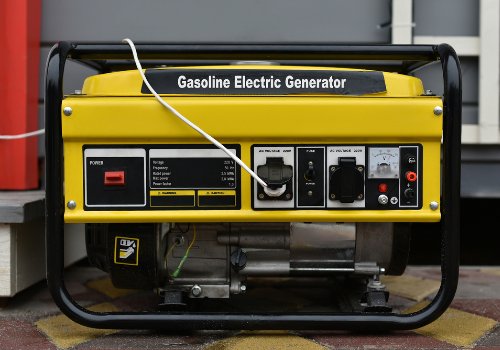
RVing often entails dry camping or dealing with campground power outages, so having a generator is critical to keep appliances and devices charged and running.
Want to Connect With a Community of Over 1,078 RV Enthusiasts?
Let’s face it, all generators make a racket, but many new models operate at a much quieter decibel level than others.
If you haven’t made an RV generator purchase yet, consider buying a model that keeps noise under 60 dB. When you then add in the tips above for reducing noise levels even further, you’ll finally have a peaceful way to have the power you require.
If you’re looking to replace your RV generator with something less harsh on the ears, check out these models:
Jackery Portable Power Station Explorer
The Jackery line of generators runs silently and emits no fumes, which is a boon for RVers who want extra power but don’t want to disrupt camping neighbors or the sounds of nature.
This eco-friendly RV generator comes with rave reviews from users who find this unit well worth the investment for camping enjoyment free of a standard generator’s humming and the constant hassle and expense of filling gas or propane tanks to keep it running.
You can pre-charge the power station from any 110-volt outlet before you leave on your RVing trip or use your 12-volt car charger along the way.
What really makes this power generator unique and ideal for RVers who are off-grid is the solar panel recharge capability.
You can buy plug-and-play (plug-n-play) Solar Sage 60W or 100W panels to harness the energy of the sun to keep your power station ready for use anywhere as long as the sun is shining.
The compact E160 model is perfect for running some lights or charging your laptop or phone, while the E1000 unit can handle running your RV fridge for 7 hours per charge or your RV lights for three days.
The complete kit can get expensive, but having power while camping without the need also to carry fuel to run a standard generator is priceless.
You can also purchase a secondary power station so you can alternate, keeping them on the solar panels to charge while the other one is in use.
I believe this type of generator is the wave of the future and ideal for RVers who strive to lessen their environmental impact.
WEN GN625i 6250-Watt RV Open Frame Inverter Generator
For loads of power with a low noise level, the WEN GN625i delivers.
This generator is the perfect solution to handle the needs of large motorhomes, travel trailers, and fifth-wheels. But even with 6250 watts, the unit runs much more quietly than older models with less power.
Because this generator features an open-frame unit, combining it with a soundproofing baffle box will readily assist in reducing the decibel level even further.
Champion 3400-Watt Dual-Fuel RV Ready Portable Inverter Generator
- Dual Fuel – Operate your 3400-watt portable generator right out of the box on either gasoline or propane, plus the unit holds…
- Convenient Electric Start with 3-Position Ignition Switch – Battery included, plus Quick Touch Panel allows you to access all…
- Ultra-Quiet Operation – 59 dBA is perfect for RVs, tailgating, your next project or backup power for your home, featuring 3400…
- Clean Power for Sensitive Electronics – RV Ready with a 120V 30A RV, plus two 120V 20A household outlets with clean electricity…
- Champion Support – Includes 3-year limited warranty with FREE lifetime technical support from dedicated experts
This Champion model generator is a great size for many RV applications and runs on both gas or propane for even more camping flexibility.
The unit boasts a running noise level of 59 dBA, which is an excellent start to keep your camping trips more relaxing. The generator features an economy mode setting that reduces fuel consumption and lowers noise even more.
Inverter generator advantages include being much more fuel-efficient than a standard generator for low-power consumption, and it produces cleaner power so it won’t harm sensitive electronic devices.
You can also run a second inverter generator in parallel to deliver more power, which you cannot do with a standard generator.
Final Thoughts
Keeping your camping trips peaceful when using a generator isn’t difficult when you know the tricks on how to quiet your RV generator.
With the right combination of sound muffling tactics, you can lower generator decibel levels by 50% or even more.
I hope you test out these methods yourself and see the difference they make when running your generator on your next RVing adventure!
How to Make a Generator Quieter – 9 Ways That Work! (Video)
"Man cannot discover new oceans unless he has the courage to lose sight of the shore."
-- Andre Gide

